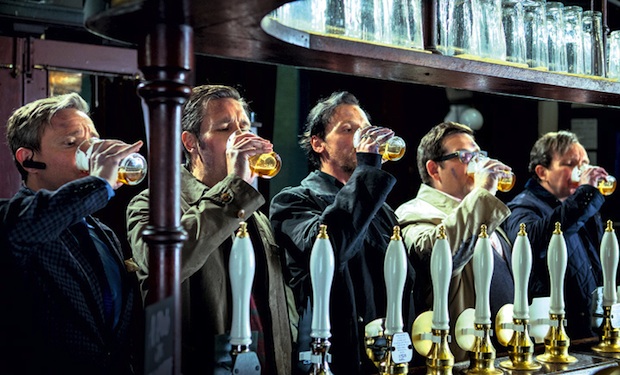Here’s a quartet of flickers playing down at the local Bijou, holdovers from a week or so back.
Top of the list is The World’s End, the third comedy from the team of writer-director Edgar Wright and writer-star Simon Pegg (we might as well add actor Nick Frost, since he’s prominently featured in all three himself). The team has come a long way since Shaun of the Dead (2004) and Hot Fuzz (2007), very funny movies, but which lack the technique and emotional vistas of this latest work.
 Wright and Pegg have hit upon an approach that avoids formula as it allows for so many variations. Starting with a large cast of characters who are, each and every, victims of their own personalities, they bore in on the most socially marginal of the group. This hero – because that’s what he becomes – resents his marginalization to the point where he thinks he should be a model for, if not the whole of society, then for a very wide circle of his friends and acquaintances. He is not a reject, but a semi-voluntary non-conformist.
Wright and Pegg have hit upon an approach that avoids formula as it allows for so many variations. Starting with a large cast of characters who are, each and every, victims of their own personalities, they bore in on the most socially marginal of the group. This hero – because that’s what he becomes – resents his marginalization to the point where he thinks he should be a model for, if not the whole of society, then for a very wide circle of his friends and acquaintances. He is not a reject, but a semi-voluntary non-conformist.
Pegg, as always, plays the square peg (sorry) who can’t seem to find the right shaped hole. A now grown ne’er-do-well who lives by sponging off his more responsible, middle-class friends, he rounds four of them up to have a redo of a 12-bar pub crawl they weren’t able to complete the night of their secondary school graduation. So back to their quiet hometown they go and start all over again.
 The sketches of the four friends is remarkably adept for a contemporary comedy (though it would have been considered par for the course in the 1940s). The pacing of the humor is sure and the big twist in the plot (analogous to those in the first two comedies) is unexpected and funny (at least if you haven’t seen the movie’s television commercials). In fact, the whole movie is funny, even when it slips in a soupcon or two of sentiment.
The sketches of the four friends is remarkably adept for a contemporary comedy (though it would have been considered par for the course in the 1940s). The pacing of the humor is sure and the big twist in the plot (analogous to those in the first two comedies) is unexpected and funny (at least if you haven’t seen the movie’s television commercials). In fact, the whole movie is funny, even when it slips in a soupcon or two of sentiment.
Lovelace is the second feature directed by the well-regarded documentary filmmakers Rob Epstein and Jeffrey Friedman. As was the case with their first, 2010’s Howl, they are basing the movie on “real life,” in this case the story of Linda Lovelace, nee Boreman, the star of Deep Throat (1972), the porn film that made explicit sex on the screen not just acceptable but chic.
The two directors haven’t fallen into the trap of making a mere docudrama, but they have constructed a peculiarity that doesn’t offer much more. In essence, they use the first half of the movie to tell the old story of Lovelace and Throat, a popular yarn that emphasized sexual freedom, taboo-breaking, the thrill of celebrity, and oddball respectability. The second half, using Lovelace’s own 1980 autobiography, Ordeal as a resource, tells a much more harrowing and ugly tale of a woman brutally forced into a porn career by an abusive boyfriend.
 The first story is told entirely objectively. Though Lovelace is the center of the camera’s attention, there’s no sense that we’re seeing the action from her or any other character’s viewpoint. That’s decidedly not the case with the second version of the tale, which begins with an older, wiser Lovelace beginning to write Ordeal and then proceeding to flashback.
The first story is told entirely objectively. Though Lovelace is the center of the camera’s attention, there’s no sense that we’re seeing the action from her or any other character’s viewpoint. That’s decidedly not the case with the second version of the tale, which begins with an older, wiser Lovelace beginning to write Ordeal and then proceeding to flashback.
 The contrasting stories don’t seem to have much point. Anyone who saw Lovelace’s name during the 15 or 20 years she was in and out of the public eye knows what she wrote in 1980, even if they didn’t read it themselves. Is there anyone left out there who believes a career in porn is all party favors? Taken separately, the two halves of Lovelace are competent, if uninspired, pieces of filmmaking. Together, they are less than the sum of their parts.
The contrasting stories don’t seem to have much point. Anyone who saw Lovelace’s name during the 15 or 20 years she was in and out of the public eye knows what she wrote in 1980, even if they didn’t read it themselves. Is there anyone left out there who believes a career in porn is all party favors? Taken separately, the two halves of Lovelace are competent, if uninspired, pieces of filmmaking. Together, they are less than the sum of their parts.
Gosh, sex is dirty – but then, so is everything human, ain’t it? Welcome to Paul Schrader’s world where everything that isn’t tawdry is literally divine. A proponent of Calvinist views (that good works not only won’t get you into heaven, but aren’t even indications of worthiness) and, less so, Jansenism (the gift of grace can be less a blessing than a curse), Schrader is usually content to lay out these premises as finished statements which he then illustrates with pictures of varying solemnity.
 The Canyons finds Schrader at his pedagogic worst; the movie, which is turgid in any case, can’t even rouse a spark of titillation from entwined limbs and bumping torsos – or the drug taking, the cruelty, the bitching and moaning and manipulating. It’s not even good soap opera, so Schrader has to force a potential for murder into the action in order to make it seem that something is at stake.
The Canyons finds Schrader at his pedagogic worst; the movie, which is turgid in any case, can’t even rouse a spark of titillation from entwined limbs and bumping torsos – or the drug taking, the cruelty, the bitching and moaning and manipulating. It’s not even good soap opera, so Schrader has to force a potential for murder into the action in order to make it seem that something is at stake.
The canyons of the title are those which surround and divide Los Angeles and which contain a large portion of the Hollywood “creative community” (as they like to be called). The little squared circle at the center of The Canyons involves a scuzzy producer, his girlfriend, an actor friend/former lover of hers, and a woman who just seems to be around for the sex.
 The two guys struggle for the affections of, as opposed to mere access to, the girlfriend. At first, the producer is depicted as playing underhanded games, but, when it suits Schrader, it is revealed the actor is sort of a cheat himself. But that’s OK because… see above.
The two guys struggle for the affections of, as opposed to mere access to, the girlfriend. At first, the producer is depicted as playing underhanded games, but, when it suits Schrader, it is revealed the actor is sort of a cheat himself. But that’s OK because… see above.
Bret Easton Ellis wrote the screenplay, which guarantees the backdrop is in a legitimately unreal Elliswood. The Canyons also engages in stunt casting. Lindsay Lohan does on screen what the tabs say she does in her “private” life and an excruciatingly untalented porn actor plays the producer. Class all the way.
 If Paul Schrader is deploying his old ideas – make that idea – Brian De Palma is recycling his fragmentary techniques in Passion, a thrill-free thriller. Everything you’d expect to see, you see. The plot features his standby doubling, with the tension between a businesswoman and her protégé mirrored by tension between the protégé and her protégé. His visual reflexes still spasm when hit with a hammer; for example, one character’s face is seen in a reflective surface so that we’ll know – as we know in nearly all De Palma’s thrillers – that she has a secret self.
If Paul Schrader is deploying his old ideas – make that idea – Brian De Palma is recycling his fragmentary techniques in Passion, a thrill-free thriller. Everything you’d expect to see, you see. The plot features his standby doubling, with the tension between a businesswoman and her protégé mirrored by tension between the protégé and her protégé. His visual reflexes still spasm when hit with a hammer; for example, one character’s face is seen in a reflective surface so that we’ll know – as we know in nearly all De Palma’s thrillers – that she has a secret self.
Based on Passion, it appears that De Palma has lost interest in everything aside from his own mechanical self. A movie isn’t a window to a world; it’s just a great big mirror filled with one tiny figure.
 I don’t know about you, but I’d head for the pub crawl.
I don’t know about you, but I’d head for the pub crawl.
–Henry Sheehan
